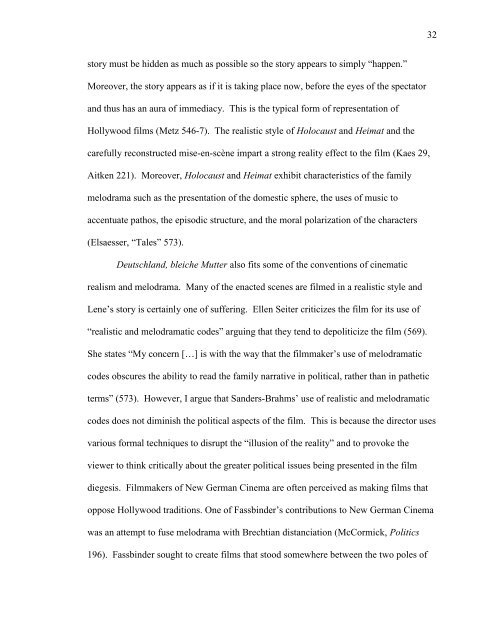'Murderer's House' - University of Victoria
'Murderer's House' - University of Victoria
'Murderer's House' - University of Victoria
Create successful ePaper yourself
Turn your PDF publications into a flip-book with our unique Google optimized e-Paper software.
story must be hidden as much as possible so the story appears to simply “happen.”<br />
Moreover, the story appears as if it is taking place now, before the eyes <strong>of</strong> the spectator<br />
and thus has an aura <strong>of</strong> immediacy. This is the typical form <strong>of</strong> representation <strong>of</strong><br />
Hollywood films (Metz 546-7). The realistic style <strong>of</strong> Holocaust and Heimat and the<br />
carefully reconstructed mise-en-scène impart a strong reality effect to the film (Kaes 29,<br />
Aitken 221). Moreover, Holocaust and Heimat exhibit characteristics <strong>of</strong> the family<br />
melodrama such as the presentation <strong>of</strong> the domestic sphere, the uses <strong>of</strong> music to<br />
accentuate pathos, the episodic structure, and the moral polarization <strong>of</strong> the characters<br />
(Elsaesser, “Tales” 573).<br />
Deutschland, bleiche Mutter also fits some <strong>of</strong> the conventions <strong>of</strong> cinematic<br />
realism and melodrama. Many <strong>of</strong> the enacted scenes are filmed in a realistic style and<br />
Lene‟s story is certainly one <strong>of</strong> suffering. Ellen Seiter criticizes the film for its use <strong>of</strong><br />
“realistic and melodramatic codes” arguing that they tend to depoliticize the film (569).<br />
She states “My concern […] is with the way that the filmmaker‟s use <strong>of</strong> melodramatic<br />
codes obscures the ability to read the family narrative in political, rather than in pathetic<br />
terms” (573). However, I argue that Sanders-Brahms‟ use <strong>of</strong> realistic and melodramatic<br />
codes does not diminish the political aspects <strong>of</strong> the film. This is because the director uses<br />
various formal techniques to disrupt the “illusion <strong>of</strong> the reality” and to provoke the<br />
viewer to think critically about the greater political issues being presented in the film<br />
diegesis. Filmmakers <strong>of</strong> New German Cinema are <strong>of</strong>ten perceived as making films that<br />
oppose Hollywood traditions. One <strong>of</strong> Fassbinder‟s contributions to New German Cinema<br />
was an attempt to fuse melodrama with Brechtian distanciation (McCormick, Politics<br />
196). Fassbinder sought to create films that stood somewhere between the two poles <strong>of</strong><br />
32

















